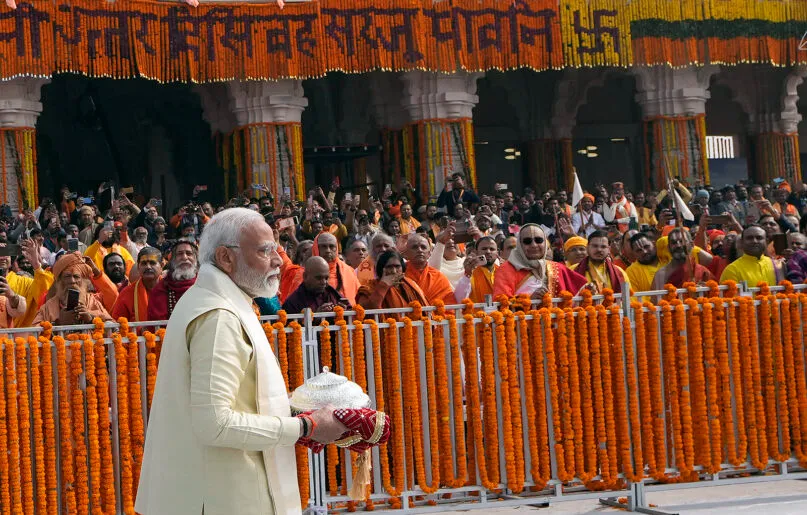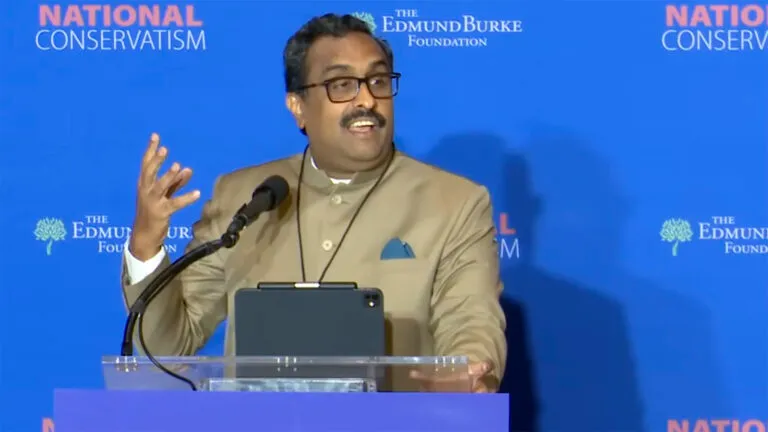Recent developments reveal a troubling trend: American far-right groups are increasingly aligning with Hindu nationalists from India. This shift was evident at the National Conservatism Conference in Washington, D.C., where Ram Madhav, a prominent figure in Indian politics, presented his views. Madhav, known for his role in the Bharatiya Janata Party (BJP) and the Rashtriya Swayamsevak Sangh (RSS), exemplifies the growing bond between the American right and India’s Hindu nationalist movement. This article examines the implications of this alliance and the broader impact on religious freedom and political dynamics.
Ram Madhav’s Influence and Presentation
Ram Madhav, who spoke at the National Conservatism Conference, has been a key figure in Hindu nationalism. His affiliations with the BJP and the RSS highlight his role in shaping and leading some of the most divisive organizations in India. During his speech, Madhav portrayed the Hindu nationalist movement as a champion of religious freedom and a model of conservative success. He depicted the construction of the Ram Temple in Ayodhya as a product of a broad conservative consensus, misleadingly suggesting widespread support for Hindu nationalism among Indians.
Reality of Hindu Nationalism
Contrary to Madhav’s portrayal, the reality of Hindu nationalism is marked by significant controversy and violence. In 2023 and 2024, groups affiliated with the RSS, including the Vishwa Hindu Parishad and Bajrang Dal, have been involved in violent acts against Muslims, such as killing cattle traders and attacking mosques. The Ram Temple construction in Ayodhya was preceded by the destruction of a historic mosque and violent riots that resulted in numerous deaths. Additionally, Madhav’s call to “reclaim” academic and media institutions reflects a broader agenda of silencing dissent and promoting Hindu nationalist ideologies.

Impact on Religious Freedom
Madhav’s entrance into the U.S. political sphere raises concerns for those committed to protecting religious freedom. Christians in India face severe persecution, with frequent attacks and bans on interfaith marriages. BJP-ruled states have seen violent assaults on Christians and the destruction of churches. These actions starkly contrast with the values of religious freedom and tolerance, and American conservatives advocating for religious freedom should be wary of endorsing or aligning with such figures.
American Right-Wing Connections
The connection between American and Indian far-right movements has deepened over recent years. In 2019, then-President Donald Trump co-hosted the “Howdy Modi” rally in Houston, an event supported by U.S.-based Hindu nationalist organizations. Steve Bannon, formerly associated with the Trump administration, led the Republican Hindu Coalition and supported the BJP’s controversial policies. More recently, figures such as Elon Musk and Vivek Ramaswamy have praised Indian Prime Minister Narendra Modi, despite ongoing issues with censorship and persecution in India.
Growing Resistance and Advocacy
In response to these developments, there is a growing resistance movement in the United States. Pro-democracy initiatives, such as Sacred Acts led by U.S. Representative Pramila Jayapal, and local efforts to combat caste discrimination in California, reflect a rising push against Hindu nationalist violence. Cities across the U.S. are passing resolutions condemning these practices, driven by organized interfaith groups advocating for human rights and tolerance.
Conclusion
The alignment between American far-right groups and Indian Hindu nationalists poses a significant challenge to the values of religious freedom and pluralism. The adoption of authoritarian tactics and the endorsement of divisive ideologies threaten to erode these core principles. Ongoing collaboration between U.S. and Indian opposition groups is crucial in defending religious freedom and promoting tolerance. By working together across borders, advocates can counter the growing threat of right-wing nationalism and uphold the democratic values shared by both nations.
FAQ
Q: Who is Ram Madhav, and what is his significance? A: Ram Madhav is a prominent Indian political figure affiliated with the Bharatiya Janata Party (BJP) and the Rashtriya Swayamsevak Sangh (RSS). His involvement in these organizations highlights his role in Hindu nationalism, which has been marked by controversial and divisive actions.
Q: What are the main concerns regarding the American far-right’s alliance with Hindu nationalists? A: The alliance raises concerns about the adoption of authoritarian tactics and the erosion of religious freedom. Hindu nationalists in India have been involved in violence against minorities, and their tactics are influencing American right-wing groups.
Q: How has the U.S. far right engaged with Hindu nationalists? A: The U.S. far right has engaged with Hindu nationalists through events like the “Howdy Modi” rally and partnerships with figures such as Steve Bannon and Elon Musk. This collaboration includes support for policies that undermine religious freedoms.
Q: What actions are being taken in the U.S. to counter Hindu nationalist influence? A: In the U.S., there is growing resistance against Hindu nationalist violence, including initiatives like Sacred Acts and local efforts to address caste discrimination. These actions aim to promote human rights and tolerance.
Q: How can American and Indian opposition groups work together to defend democratic values? A: American and Indian opposition groups can collaborate by advocating for religious freedom, combating authoritarian practices, and supporting pro-democracy initiatives. Joint efforts across borders can help counter the rise of right-wing nationalism.


